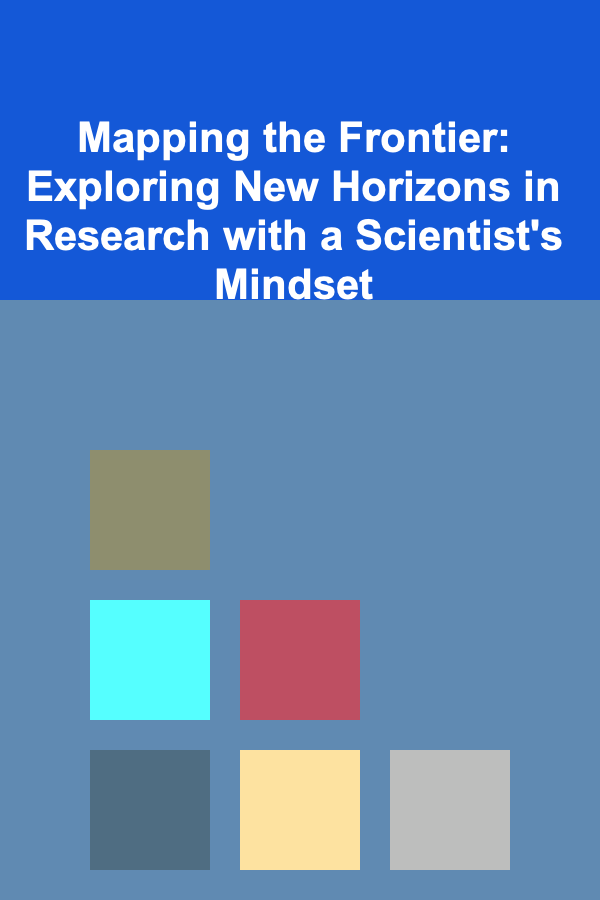
Mapping the Frontier: Exploring New Horizons in Research with a Scientist's Mindset
ebook include PDF & Audio bundle (Micro Guide)
$12.99$11.99
Limited Time Offer! Order within the next:

Scientific research is a journey into the unknown. Every experiment, every theory, and every hypothesis represents a step into uncharted territory. It is the pursuit of knowledge that propels humanity forward, opening new doors and offering fresh perspectives on the world. The mindset of a scientist is one that embraces uncertainty, seeks solutions through inquiry, and is willing to explore new frontiers. This article provides an actionable guide for researchers to cultivate the mindset necessary to thrive in the exploration of new horizons in research.
The Scientist's Mindset: Embrace Curiosity and Uncertainty
At the core of scientific inquiry is curiosity. A scientist's mindset is fundamentally shaped by an unquenchable desire to understand the world and its complexities. This mindset begins with the willingness to question everything, challenge assumptions, and embrace the unknown.
Cultivating a Growth Mindset
A growth mindset is a belief that intelligence and capabilities can be developed through effort and learning. Researchers with this mindset see challenges as opportunities for growth, rather than obstacles. This attitude allows you to remain flexible in your approach and persevere when experiments don't go as planned.
- Actionable Tip: Every time you face a challenge, ask yourself what you can learn from it. Shift your focus from the outcome to the process of learning and discovery. Document your setbacks as a way to track your growth and build resilience.
Embrace Ambiguity
In research, the path is rarely clear, and the answers are often not immediately obvious. Embracing ambiguity means not being afraid to venture into areas where there are no straightforward solutions. Instead of seeking easy answers, you must be comfortable navigating complexity and uncertainty.
- Actionable Tip: Start each project with a mindset that acknowledges uncertainty. Formulate research questions that push the boundaries of current knowledge, even if the answer is not immediately clear. Allow your inquiry to evolve as you uncover new information.
Ask Bold, Groundbreaking Questions
Innovation often begins with a bold question. The ability to ask the right questions is one of the most important aspects of scientific research. Groundbreaking research is not about simply confirming existing knowledge, but about challenging current paradigms and asking questions that push the boundaries of understanding.
Think Beyond the Known
Great scientists are often those who can see the world in new ways. They can connect seemingly unrelated ideas and apply them in novel contexts. Rather than asking "What do we know?" ask "What do we not know, and how can we uncover it?"
- Actionable Tip: Practice lateral thinking by exploring questions outside the conventional boundaries of your discipline. Engage with other fields of study and seek interdisciplinary approaches that might reveal novel solutions to old problems.
Frame Research with Big Questions
Start your research with big, overarching questions that challenge existing frameworks. These questions should not only seek to solve problems but to transform our understanding of the world. Big questions lead to new avenues of inquiry and can spark innovation in unexpected places.
- Actionable Tip: When designing a new project, begin by asking, "What is the biggest unanswered question in my field?" Focus on finding ways to address this question and be prepared for your research to lead in unexpected directions.
Building a Robust Research Design
Once you have identified bold, groundbreaking questions, the next step is to create a research design that is rigorous and methodologically sound. A robust research design will allow you to test your hypotheses effectively and ensure that your findings are reliable and valid.
Start with Hypothesis Testing
A clear hypothesis forms the foundation for any experiment. It is the educated guess that you aim to test through your research. A well-defined hypothesis should be specific, testable, and based on existing knowledge, but it should also push the boundaries of what is currently known.
- Actionable Tip: Construct your hypothesis by identifying gaps in existing literature. Focus on how your hypothesis could fill those gaps and propose innovative methods for testing it.
Prioritize Reproducibility and Reliability
Reproducibility is a cornerstone of scientific research. A research design should ensure that experiments can be repeated with the same results. Reliability, on the other hand, refers to the consistency of your measurements over time. Ensuring both allows your findings to be credible and widely applicable.
- Actionable Tip: When designing experiments, ensure that your methodology is clearly documented, including all variables and controls. This transparency makes it easier for others to replicate your work, which is essential for establishing trust in your findings.
Integrate Data Quality from the Start
The quality of your data is just as important as your research design. Data must be accurate, consistent, and appropriately analyzed to produce meaningful conclusions. Building a solid foundation of data integrity will enhance the value of your research and increase its impact.
- Actionable Tip: Set up systems to ensure that your data is clean and accurate from the outset. Use tools for data management and establish protocols for validating data regularly throughout your research process.
Navigating Challenges and Overcoming Failure
Every researcher will face setbacks, whether it's an unexpected experimental result, difficulty in data analysis, or a hypothesis that doesn't hold up. The ability to navigate challenges and failure with resilience is what separates successful scientists from others.
View Failure as a Learning Opportunity
Failure is an inherent part of the scientific process. It is through failures that new ideas emerge, and solutions to complex problems are found. Instead of viewing failure as a negative outcome, treat it as feedback for improvement.
- Actionable Tip: After every failure, conduct a post-mortem analysis. Identify what went wrong, what could be done differently, and what new questions emerged as a result. This reflection helps you refine your approach and continue moving forward.
Cultivate Resilience and Perseverance
Research is often a long and arduous process. The ability to remain persistent in the face of challenges is a hallmark of successful scientists. When you encounter obstacles, it's crucial to remain focused on the bigger picture and not get discouraged by temporary setbacks.
- Actionable Tip: Establish small, achievable goals within the larger project framework. Celebrate these milestones to maintain motivation and focus, even when the broader goals feel distant or difficult to reach.
Collaboration: The Power of Collective Knowledge
The most significant breakthroughs often come from collaboration. Science is a collective endeavor, and many of the challenges faced in research require the expertise and perspectives of multiple individuals. Working with other scientists can provide new insights, resources, and expertise that elevate the quality of your research.
Leverage Interdisciplinary Expertise
Collaborating with researchers from different disciplines can spark new ideas and innovative approaches. By combining expertise from various fields, you can address complex problems from multiple angles and bring fresh perspectives to your research.
- Actionable Tip: Seek out collaborations with researchers who possess complementary skills or expertise outside your primary area of study. This can lead to creative solutions that you may not have considered on your own.
Build Strong, Trusting Relationships
Effective collaboration requires trust, mutual respect, and clear communication. Strong relationships between researchers lead to more productive and meaningful partnerships. This includes open dialogue about research goals, expectations, and shared responsibilities.
- Actionable Tip: Establish clear roles and responsibilities within collaborative projects to ensure that each team member contributes effectively. Set up regular meetings to track progress, address issues, and foster a collaborative environment.
Communicating Your Findings and Impacting the World
Ultimately, the value of scientific research lies in its ability to make an impact. Effective communication of your findings is essential for spreading knowledge and encouraging further research. The broader scientific community and society benefit from well-communicated discoveries that can drive innovation, policy change, and societal progress.
Publish and Present with Precision
Publishing your research in peer-reviewed journals is a fundamental way to disseminate your findings. It ensures that your work is scrutinized by other experts and contributes to the body of knowledge in your field. Presenting your work at conferences also provides opportunities for feedback and collaboration.
- Actionable Tip: When writing a paper or preparing a presentation, focus on clarity and conciseness. Ensure that the implications of your research are clearly articulated and that your conclusions are supported by data. Practice your presentations and anticipate potential questions to improve communication skills.
Engage with a Broader Audience
While academic publications are important, engaging with a broader audience through public outreach is equally valuable. Communicating the relevance and importance of your work to non-experts increases public understanding of science and its role in society.
- Actionable Tip: Use social media platforms, blogs, or podcasts to share key insights from your research in a way that is accessible to a general audience. Participate in science festivals or outreach programs to inspire others to appreciate and support scientific endeavors.
Conclusion
Mapping the frontier of scientific discovery requires more than just technical knowledge and expertise. It requires a mindset that embraces curiosity, resilience, and collaboration. It's about asking bold questions, challenging assumptions, and learning from both successes and failures. With the right mindset, scientists can explore new horizons, uncover new knowledge, and ultimately change the world. The journey may be long and filled with challenges, but the impact of your research will resonate far beyond the laboratory, shaping the future of science and society for years to come.
Reading More From Our Other Websites
- [Home Maintenance 101] How to Choose and Maintain a Carbon Monoxide Detector: Protecting Your Family's Health
- [Home Holiday Decoration 101] How to Transform Your Dining Room for a Holiday Feast
- [Personal Financial Planning 101] How to Save for a House Deposit on a Tight Budget
- [Home Party Planning 101] How to Organize a Budget-Friendly Home Party Without Sacrificing Fun
- [Personal Care Tips 101] How to Choose the Best Scented Body Butter for a Luxurious Experience
- [Digital Decluttering Tip 101] Best Digital Decluttering: Beyond the Files -- Reclaiming Your Digital Wellbeing & Time
- [Home Party Planning 101] How to Organize a Party Playlist Featuring Only 90s Throwbacks
- [Home Storage Solution 101] How to Organize Your Home Library for Easy Access to Books
- [Organization Tip 101] DIY Grab Bar Installation: Tips for a Secure and Safe Setup
- [Sewing Tip 101] Innovative Sewing Gadgets That Will Revolutionize Your Projects

How to Keep Vintage Books Organized and Protected
Read More
How to Maintain Your HVAC System for Optimal Performance
Read More
How to Make a Financial Plan for Your Side Hustle
Read More
How to Maximize Small Spaces When Staging My Home
Read More
How to Set Up a Family Art and Craft Corner
Read More
10 Tips for a Movie Night Checklist Tailored to Different Age Groups
Read MoreOther Products

How to Keep Vintage Books Organized and Protected
Read More
How to Maintain Your HVAC System for Optimal Performance
Read More
How to Make a Financial Plan for Your Side Hustle
Read More
How to Maximize Small Spaces When Staging My Home
Read More
How to Set Up a Family Art and Craft Corner
Read More